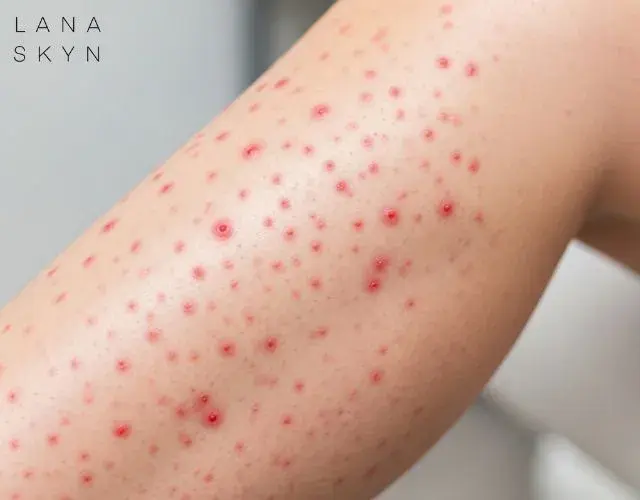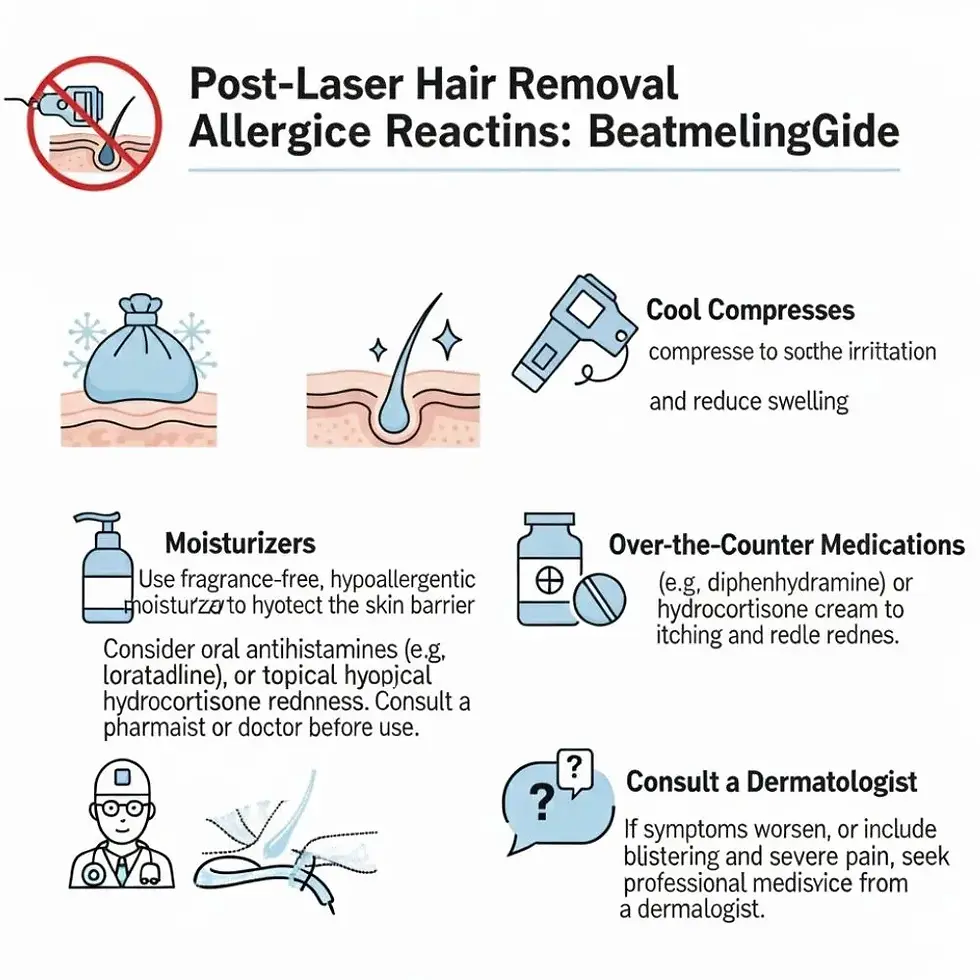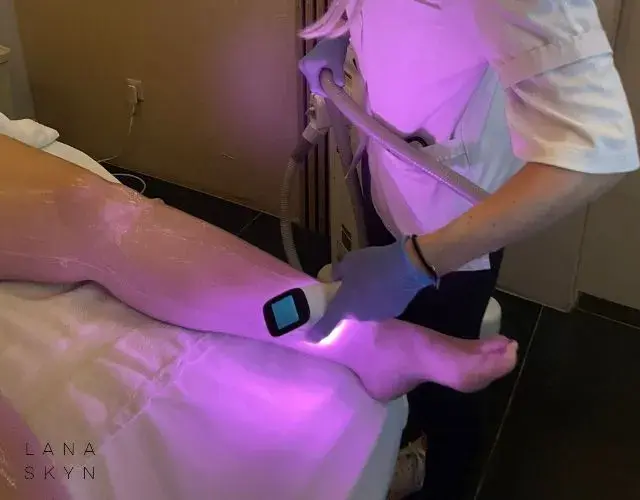Allergic reaction after laser treatment: Causes and solutions
- Lana Skyn

- Dec 28, 2024
- 6 min read
Updated: Oct 1, 2025
Laser treatments for cosmetic needs are becoming popular in the Netherlands like hair removal, skin spot treatment, and tattoo removal. While generally safe, allergic reactions are rare but possible. Before treatment, it's important to understand the signs of allergies and how to manage them.
In this blog, we will explain how to avoid potential allergic reactions after laser treatment and provide all the necessary information in the event of this happening.
What Causes Allergic Reactions from Laser Treatments

An allergic reaction happens when your skin reacts badly to a substance or procedure. After laser treatments, this could be due to:
The heat from the laser.
The cooling gel applied to your skin during treatment.
Products used post-treatment.
Your immune system sees these as threats, causing a reaction. Therefore, it creates inflammation, redness, swelling, and other symptoms.
Laser treatment is typically harmless. However, allergic reactions after laser hair removal are possible. The severity of these reactions depend on individual factors. Mild reactions usually fade within a few days. Severe cases may take weeks to heal. In this case, proper treatment and aftercare will speed up recovery.
How Histamines Trigger Skin Reactions
Hives, also called urticaria, are raised, red, itchy welts that appear on the skin. They occur when the body releases histamines, chemicals produced by the immune system in response to perceived threats. Histamines cause blood vessels to widen and the skin to become inflamed, leading to redness, swelling, and itching.
After laser treatments, some people may experience hives due to irritation or an allergic response. While common post-laser redness or swelling is usually temporary, true histamine reactions are rare. These reactions can appear within hours or sometimes a few days after treatment. Hives may burn, sting, or itch, and they often form small clusters around the treated area.
Common symptoms of allergic reactions
Not every irritation after laser treatment is an allergic reaction. However, if you experience any of the following signs, it might indicate an allergy:
Redness and swelling: This is the most common sign. The visible symptoms typically come immediately after the procedure. Minor redness is always an example of a laser treatment reaction, but severe swelling suggests an allergic reaction.
Itching: Itching after laser hair removal is another symptom that usually occurs when the skin is irritated or swollen. It pricks and itches at that time. It may either be mild or severe but you worsen the situation once you scratch the adjacent area.
Rashes or hives: Grown, itchy bumps or patches (hives) with brown or red spots can develop in the skin after laser treatment. The rashes vary in size and severity and can be accompanied by redness or swelling after a few hours after laser hair removal.
Blisters: In rare cases, laser treatments cause blisters or small bumps filled with fluid on the skin. Some may be very painful and take longer to heal. At the same time, others can be infected if treatment is not done correctly.
Increased sensitivity: The skin can feel a bit more tender and hypersensitive. It might be a side effect or allergic reaction to the laser treatment.
How Common Are Allergic Reactions After Laser Treatment?
Allergic reactions after laser treatments are very rare. Most patients experience mild redness, swelling, or irritation that disappears within a few hours to a couple of days. True allergic reactions, such as hives or severe swelling, occur in only a small fraction of cases.
Large-scale studies show that less than 1% of patients develop serious allergic responses. Factors like pre-existing allergies, sensitive skin, or previous reactions to skincare products can slightly increase the risk. However, most reactions are mild and short-lived, requiring minimal care.
Causes of allergic reactions after laser treatment

Allergic reactions after laser treatment can happen when the immune system goes overboard after the treatment. Various reasons can be related to it:
Type and sensitivity of skin
People with sensitive skin can easily develop allergic reactions, more than anyone else. Laser treatment will affect your skin if you have an earlier history of other skin conditions. Additionally, dark or light skin tones tend to react toward specific laser treatments.
Products used before or after treatment
Some numbing creams or chemicals used before the laser procedure may be formulated with ingredients that cause damage to the skin. Many post-treatment creams or cooling gels can also have ingredients that may cause allergic reactions. Allergens potentially include fragrances, chemical compounds, and specific ingredients.
Preexisting skin conditions
Underlying skin conditions are bound to become worse after a laser treatment. Conditions like eczema or psoriasis increase the chances of reactions after a laser treatment.
Laser intensity
Lasers of higher intensity create more heat. It can cause skin to be burned after laser treatment. It can lead to skin irritation and an allergic reaction. Therefore, using the appropriate laser settings based on your skin type and condition is essential.
Improper aftercare
Recovery depends highly on aftercare. If someone does not follow aftercare recommendations, such as avoiding sunlight or other harsh products, the chances of having allergic reactions increase.
Who Is at Higher Risk for Allergic Reactions?
While allergic reactions after laser treatment are rare, certain individuals may have a slightly higher risk. Knowing these factors can help you take extra precautions and discuss concerns with your practitioner before treatment.
People who may be at higher risk include:
Individuals with a history of allergies: Those prone to allergic rhinitis, food allergies, or previous skin reactions.
Sensitive skin types: People whose skin reacts easily to creams, gels, or minor irritations.
Patients with pre-existing skin conditions: Conditions like eczema or psoriasis can increase the likelihood of reactions.
Hormonal fluctuations: Women during puberty, menstruation, or menopause may experience heightened skin sensitivity.
Stress or anxiety-prone individuals: Emotional stress can trigger or worsen skin reactions.
Certain treatment areas or skin tones: Areas like the face, arms, or legs, and darker skin tones may be slightly more prone.
How to treat allergic reactions

Wherever an allergy appears, it needs to be taken care of immediately. Otherwise, there will be complications. Here is how to treat an allergic reaction:
Cool compresses
Apply a cool, damp towel to the affected area. It should help to reduce pain, redness, and swelling. Do not put ice directly on the skin, as it will irritate the skin more. Soaked and cool compresses significantly soothe inflamed skin.
Moisturizers
After the initial cooling process, use a moisturizer to hydrate and protect the skin. Dry skin can worsen allergic reactions. Use fragrance-free gentle moisturizers for skin hydration. We recommend selecting the formulations made for sensitive skin. It helps create the least risk of irritation.
Medications
Medications like the Antihistamine dose can decrease minor allergic symptoms. Oral antihistamines, such as Benadryl, can reduce the itchiness and swelling during allergic responses. These can be purchased in any pharmacy and sold over the counter.
Hydrocortisone external creams also relieve itching and inflammation after laser treatment. Apply this cream carefully onto the irritated area as directed. Your doctor could prescribe some steroids or other treatment if the reaction is more severe than it first appeared.
Consult a dermatologist
If the symptoms have not gone away or even worsened, medical advice must be taken from a dermatologist immediately. Severe symptoms like difficulty in breathing require immediate medical attention. They might prescribe a stronger treatment or medicine to act against the reaction and prevent further complications.
How to prevent allergic reactions after laser treatment
To prevent allergic reactions after laser hair removal, follow these tips from Lana Skyn:
Patch test: Ask for a patch test before treatment to check if your skin reacts to the cooling gel or creams used.
Choose a good clinic: Pick a licensed, experienced clinic like ours. Read reviews, check certifications, and ensure they use modern equipment.
Follow aftercare: Follow all aftercare instructions, like avoiding sun exposure, not scratching the area, and using recommended skincare.
Inform allergies: Tell your practitioner about any allergies or previous skin issues to ensure safe and suitable treatment.
When to see a doctor?
We recommend seeking immediate medical attention if:
The reaction spreads to other parts of your body.
You experience severe swelling or blistering.
A fever over 101°F (38°C) could suggest an infection.
Symptoms persist for more than a week.
Breathing difficulties occur (this is rare but requires emergency care).
Conclusion
Laser treatments can effectively improve your skin's appearance. However, a rare concern is an allergic reaction. Knowing how to prevent, manage, and seek help for such issues can make a big difference.
If you're considering laser treatment in the Netherlands, take the time to choose a reputable laser clinic like ours. Inform our professionals about any allergies and follow our aftercare instructions carefully. With the right approach, you can minimize allergic reactions and enjoy the full benefits of laser treatments!
Frequently asked questions
How long after laser treatment can an allergic reaction occur?
An allergic reaction can occur immediately after the procedure or a few hours later. Sometimes, it may even take a few days for symptoms to appear.
Can laser treatment be done again after an allergic reaction?
Yes, laser treatment can be done again after an allergic reaction, but only after consulting a dermatologist. They may recommend an adjustment or a milder laser setting to prevent further reactions. You should do it after completely healing the previous reaction.
How long should I wait to schedule another laser treatment after an allergic reaction?
It’s best to wait until your skin has fully healed, which may take a while. Consult your dermatologist to determine the appropriate time for your next laser session.




Comments